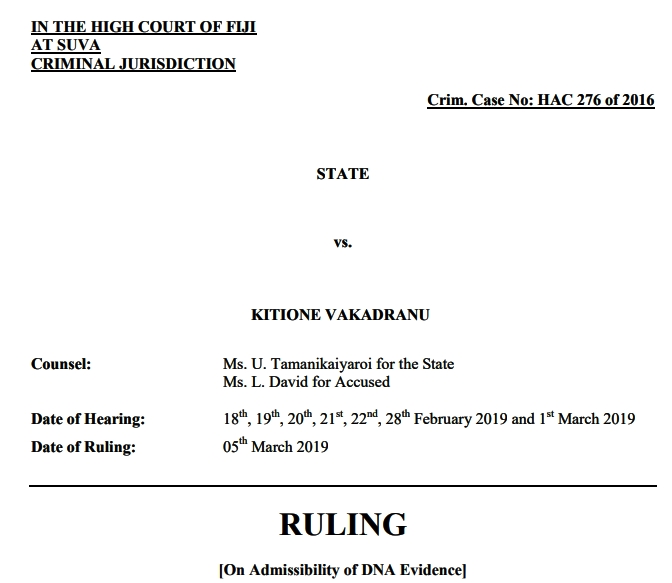In a first for Fiji, the Suva High Court has ruled that it can’t use DNA results as evidence in a rape trial because the Fiji Police Force did not use the correct procedures in obtaining the DNA tests from the accused.
Justice Thushara Rajasinghe ruled this week that the Constitutional rights of the accused man, Kitione Vakadranu were breached.
Key to his findings, Judge Rajasinghe has said that at the time Vakadranu’s clothing and buccal (mouth swab) samples was taken by police at Nasinu police station, his consent was not obtained nor did police explain the reasons as to why they were being taken.
Deoxyribonucleic Acid, commonly known as DNA, is a genetic blueprint of the human body. DNA evidence emerged as a reliable scientific evidence in the mid-1980s and gained its popularity and the confidence of its accuracy in the 1990s. In Fiji it is used across a range of criminal investigations.
The Judge has cited Section 14 (2) (j) of the Constitution which states: “Every person charged with an offence has the right to remain silent, not to testify during the proceedings, and not to be compelled to give self-incriminating evidence, and not to have adverse inference drawn from the exercise of any of these rights”.
Justice Rajasinghe said any DNA evidence that is constructed using the DNA sample obtained from the accused without his or her informed consent, would amount to self-incriminating evidence against the accused.
“Hence, such evidence would become unlawfully obtained evidence in breach of the constitutional rights of the accused. Such evidence is not allowed to be adduced against the accused,” he ruled.
Three Fiji police force officers were involved in investigating Vakadranu and the Judge ruled they gave different versions of evidence on how the DNA samples were obtained.
“In view of these contradictions and inconsistencies in the evidence of Sgt. Vinod, Sgt. Naupoto and DC Lualala, I find reasonable doubt about the credibility and reliability of the evidence given by Sgt. Vinod and Sgt. Naupoto regarding the collection of buccal swab and clothes of the accused for the DNA testing. Both Sgt. Vinod and Sgt. Naupoto in their respective evidence, admitted that they have not explained the accused that the result of the testing would be used in evidence against him,” the Judge ruled.
“In view of these reasons discussed above, I find that the prosecution has failed to prove beyond reasonable doubt that the accused has given his informed consent to obtain his clothes and buccal swab for DNA testing. Hence, I find the collection of the clothes and the buccal swab of the accused in order to construct the DNA test result is in breach of his rights under Section 8, 9, 12, 13 (1) (d), 14 (2) (j) and (k) of the Constitution. I accordingly rule that the DNA test report is not admissible in evidence,” Justice Rajasinghe ruled.
The matter is now expected to go to a retrial, minus the DNA evidence.
